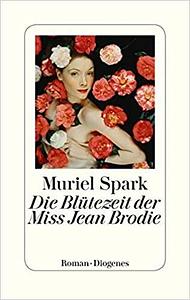You need to sign in or sign up before continuing.
Take a photo of a barcode or cover
funny
tense
funny
lighthearted
Plot or Character Driven:
Character
Loveable characters:
No
Diverse cast of characters:
No
Flaws of characters a main focus:
Yes
Another review that feels like it needs to be prepended with disclaimers given this book's overwhelming popularity.
After having read The Prime of Miss Jean Brodie I ended up looking through a couple of pages of the 4/5 star reviews to try and understand what I'd missed out on, what other people got from this book that I didn’t. It seems that many people who liked this book had seen the Maggie Smith adaption of it first, so possibly I was missing something from not having seen the film?
But what the majority enjoyed about this novel is what drove me crazy, starting with the central character herself.
Jean Brodie is a highly functioning sociopath. She manipulates the children in her care to sculpt their sense of self, self-worth, and grooms a couple of them for revenge/replacement sex. And the bullying! Every interaction with Mary made me cringe.
How is this woman heralded as an anti-hero in modern fiction?
I’ve seen a couple of arguments that this book was very progressive for its time and that Brodie is a revolutionary character. This was written in the 60’s, this style, these characters are NOT progressive.
Brodie is about as likable as Holden Caulfield but with none of the youth to excuse her behavior. But a character doesn’t have to be likable for a book to be enjoyable, so putting Brodie aside as a character, what of the children (and eventually youths) that form the Brodie set? Despite Spark repeatedly ramming their ‘defining’ characteristics down our throats, they all merge into one another: bland, impressionable children. Sandy, the more fleshed out character of the bunch, does however entertain with her daydreams and fictional accounts of Brodie’s private life. These occasional paragraphs are the best bits of the novel.
The use of repetition is interesting for the first 2-3 pages. For me, at least, the girls being ‘known’ for something was part of Brodie’s influence: if you tell a child they’re stupid every day for 3 years, they’ll likely end up thinking they’re stupid. It would have been interesting to compare what the girls could have been known for before Brodie’s influence to what they did become known for after all.
After those first couple of pages though, the repetition starts feeling like filler. Were this a weekly installment it could be justified but with a novel this brief and lacking in content these repetitions stick out.
The repetitions of 'Brodie in her prime’ is aggravating beyond belief. By page 10 I did not care about Brodie anymore. Can you imagine if this central character were a man in a mid-life crisis? Is this still a ‘charming’ story with the gender swapped? urgh
The final thing that other reviewers seemed to enjoy so much was the flash-forward glimpses of the girl’s futures. Again, this felt like a device to break up the lack of story.
So I suppose after writing this review I have almost nothing positive to say about The Prime of Miss Jean Brodie. I need a novel to deliver something to me, one of either: a rich character, interesting character dynamics, a good setting, a good plot. If these is none of these, I can’t but give it a 1 star. Sad I this turned out to be such a dud as I love books in a school setting. So it goes, so it goes.

After having read The Prime of Miss Jean Brodie I ended up looking through a couple of pages of the 4/5 star reviews to try and understand what I'd missed out on, what other people got from this book that I didn’t. It seems that many people who liked this book had seen the Maggie Smith adaption of it first, so possibly I was missing something from not having seen the film?
But what the majority enjoyed about this novel is what drove me crazy, starting with the central character herself.
Jean Brodie is a highly functioning sociopath. She manipulates the children in her care to sculpt their sense of self, self-worth, and grooms a couple of them for revenge/replacement sex. And the bullying! Every interaction with Mary made me cringe.
How is this woman heralded as an anti-hero in modern fiction?
I’ve seen a couple of arguments that this book was very progressive for its time and that Brodie is a revolutionary character. This was written in the 60’s, this style, these characters are NOT progressive.
Brodie is about as likable as Holden Caulfield but with none of the youth to excuse her behavior. But a character doesn’t have to be likable for a book to be enjoyable, so putting Brodie aside as a character, what of the children (and eventually youths) that form the Brodie set? Despite Spark repeatedly ramming their ‘defining’ characteristics down our throats, they all merge into one another: bland, impressionable children. Sandy, the more fleshed out character of the bunch, does however entertain with her daydreams and fictional accounts of Brodie’s private life. These occasional paragraphs are the best bits of the novel.
The use of repetition is interesting for the first 2-3 pages. For me, at least, the girls being ‘known’ for something was part of Brodie’s influence: if you tell a child they’re stupid every day for 3 years, they’ll likely end up thinking they’re stupid. It would have been interesting to compare what the girls could have been known for before Brodie’s influence to what they did become known for after all.
After those first couple of pages though, the repetition starts feeling like filler. Were this a weekly installment it could be justified but with a novel this brief and lacking in content these repetitions stick out.
The repetitions of 'Brodie in her prime’ is aggravating beyond belief. By page 10 I did not care about Brodie anymore. Can you imagine if this central character were a man in a mid-life crisis? Is this still a ‘charming’ story with the gender swapped? urgh
The final thing that other reviewers seemed to enjoy so much was the flash-forward glimpses of the girl’s futures. Again, this felt like a device to break up the lack of story.
So I suppose after writing this review I have almost nothing positive to say about The Prime of Miss Jean Brodie. I need a novel to deliver something to me, one of either: a rich character, interesting character dynamics, a good setting, a good plot. If these is none of these, I can’t but give it a 1 star. Sad I this turned out to be such a dud as I love books in a school setting. So it goes, so it goes.

reflective
sad
medium-paced
Plot or Character Driven:
Character
Strong character development:
No
Loveable characters:
No
Diverse cast of characters:
No
Flaws of characters a main focus:
Yes
3.5-4 stars
This was a confusing book for me to listen to, so after I listened, I went back and read over it so I could figure out all the jumps in time (there were a lot of them). Reading it was much easier to keep track of what happened when and it also made it easier to follow the threads of the different themes: sexuality/prime/spinsterhood, education/intrusion, religion/predestination, authority/social groups, instinct/insight. This is a difficult book for me to review because I read it for a book study, but then didn't get a chance to attend and discuss. I believe I could have gained much from the discussion. Still, I enjoyed listening to it (even when it was confusing) and it was both disturbing and humorous, and it was interesting going back over the written version to follow the themes. Overall, I would say this is a book that is worth checking out and would be interesting to discuss with others.
This was a confusing book for me to listen to, so after I listened, I went back and read over it so I could figure out all the jumps in time (there were a lot of them). Reading it was much easier to keep track of what happened when and it also made it easier to follow the threads of the different themes: sexuality/prime/spinsterhood, education/intrusion, religion/predestination, authority/social groups, instinct/insight. This is a difficult book for me to review because I read it for a book study, but then didn't get a chance to attend and discuss. I believe I could have gained much from the discussion. Still, I enjoyed listening to it (even when it was confusing) and it was both disturbing and humorous, and it was interesting going back over the written version to follow the themes. Overall, I would say this is a book that is worth checking out and would be interesting to discuss with others.
reflective
medium-paced
Plot or Character Driven:
Character
Strong character development:
No
Loveable characters:
Complicated
Diverse cast of characters:
No
Flaws of characters a main focus:
Complicated
Terse. That’s the first word I can think of describe the text of this book. The author doesn’t write with a lot of depth to her characters and holds each of them mainly at a clinical arms length.
Miss Jean Brodie, in her self-declared prime, is wholly focused on a set of girls in her instruction at the Marcia Blaine School for Girls,’in Edinburough. It cannot be said that she is an exceptional teacher, opting to distance herself from the other more traditional instructors and prizing her independent thinking. But, she is invested in HER girls, in her own way. She takes them to around the city, introduces them to culture, but also breaches the student-teacher tradition by telling them of her love life, encouraging them to obfuscate what she is talking to them about from the headmistress who wants her to leave the school, and by shoe-horning each girl by her self own estimation of what their futures will entail: including encouraging one of her girls to have an affair with the man she herself loves (the art teacher who is a married man with a large catholic family).
She is a complex woman, with questionable values from her willingness to cross boundaries, have affairs, belittle Catholicism (but otherwise attend services in all of the other religious services around her), and seemingly support fascism as a better system of governance. She is independently minded, always. She answers to her own particular guidance, and she seems altogether lonely and prepared to be alone, which feels motivating for her to become overly invested and personal with “her lot” of girls.
There’s a lot to chew on, not least of which being Sandy, the primary perspective of the story, and what she makes of Miss Brodie throughout her own life.
Miss Jean Brodie, in her self-declared prime, is wholly focused on a set of girls in her instruction at the Marcia Blaine School for Girls,’in Edinburough. It cannot be said that she is an exceptional teacher, opting to distance herself from the other more traditional instructors and prizing her independent thinking. But, she is invested in HER girls, in her own way. She takes them to around the city, introduces them to culture, but also breaches the student-teacher tradition by telling them of her love life, encouraging them to obfuscate what she is talking to them about from the headmistress who wants her to leave the school, and by shoe-horning each girl by her self own estimation of what their futures will entail: including encouraging one of her girls to have an affair with the man she herself loves (the art teacher who is a married man with a large catholic family).
She is a complex woman, with questionable values from her willingness to cross boundaries, have affairs, belittle Catholicism (but otherwise attend services in all of the other religious services around her), and seemingly support fascism as a better system of governance. She is independently minded, always. She answers to her own particular guidance, and she seems altogether lonely and prepared to be alone, which feels motivating for her to become overly invested and personal with “her lot” of girls.
There’s a lot to chew on, not least of which being Sandy, the primary perspective of the story, and what she makes of Miss Brodie throughout her own life.
Minor: Adult/minor relationship, Death, Infidelity, Sexism
This did not have the atmosphere I was expecting or hoping for. For that reason, I'm definitely going to have to read this again in the future. I enjoyed this, but hopefully a second read will help heighten my appreciation even more. Otherwise I feel pretty 'meh' about it. Not a bad take on an idea that I've seen many times before.
It was excellent. I would need to re-read to catch more details, because there are many. I loved the pacing & the tone, most of all, its emotional sensibility and simultaneous sharp sense of caricature. I wished the ending was longer.
emotional
funny
sad
medium-paced
Plot or Character Driven:
Character
Strong character development:
Yes
Loveable characters:
Yes
Diverse cast of characters:
No
Flaws of characters a main focus:
Yes
This is the latest choice in my Modern Library Book Club. And I must say this book has made me officially start to wonder what the people who put together that list think great literature is. I was confounded by the simplicity of this book - and thought that the betrayal that is set up to be so turning was extremely anti-climatic. The way that the author skips from current narrative to past to speculative did not add to the book, but actually made me angry. Just when I became interested, we were off track and headed in a unclear direction.
The only reason this book gets two stars is because of the character of Ms. Jean Brodie. I women that I would champion as one of the most odd-ball I have every read about. She is a teacher that refuses to teach - but rather uses her students as an outlet for personal therapy and attempts to use them to live the life choices she wishes she had the gumption for. I appreciated her for a number of humorous moments - and did want to know what she would say next. But my issue was that I did not care what she would do next. Her actions meant little to me.
The Brodie set, in my mind, was so ill developed that I did not really care about any of them. Sandy, who I would say is the other protagonist of the novel, kept popping into my head as Ms. Piggy with squinty eyes. And though that makes me laugh now, did not help me with her throughout the book. And her anger against Ms. Brodie, and the decision she made to work against her did not clearly make sense to me.
I do not think I would tell anyone to read this book - but maybe the movie would be fun. I do love Maggie Smith.
The only reason this book gets two stars is because of the character of Ms. Jean Brodie. I women that I would champion as one of the most odd-ball I have every read about. She is a teacher that refuses to teach - but rather uses her students as an outlet for personal therapy and attempts to use them to live the life choices she wishes she had the gumption for. I appreciated her for a number of humorous moments - and did want to know what she would say next. But my issue was that I did not care what she would do next. Her actions meant little to me.
The Brodie set, in my mind, was so ill developed that I did not really care about any of them. Sandy, who I would say is the other protagonist of the novel, kept popping into my head as Ms. Piggy with squinty eyes. And though that makes me laugh now, did not help me with her throughout the book. And her anger against Ms. Brodie, and the decision she made to work against her did not clearly make sense to me.
I do not think I would tell anyone to read this book - but maybe the movie would be fun. I do love Maggie Smith.






